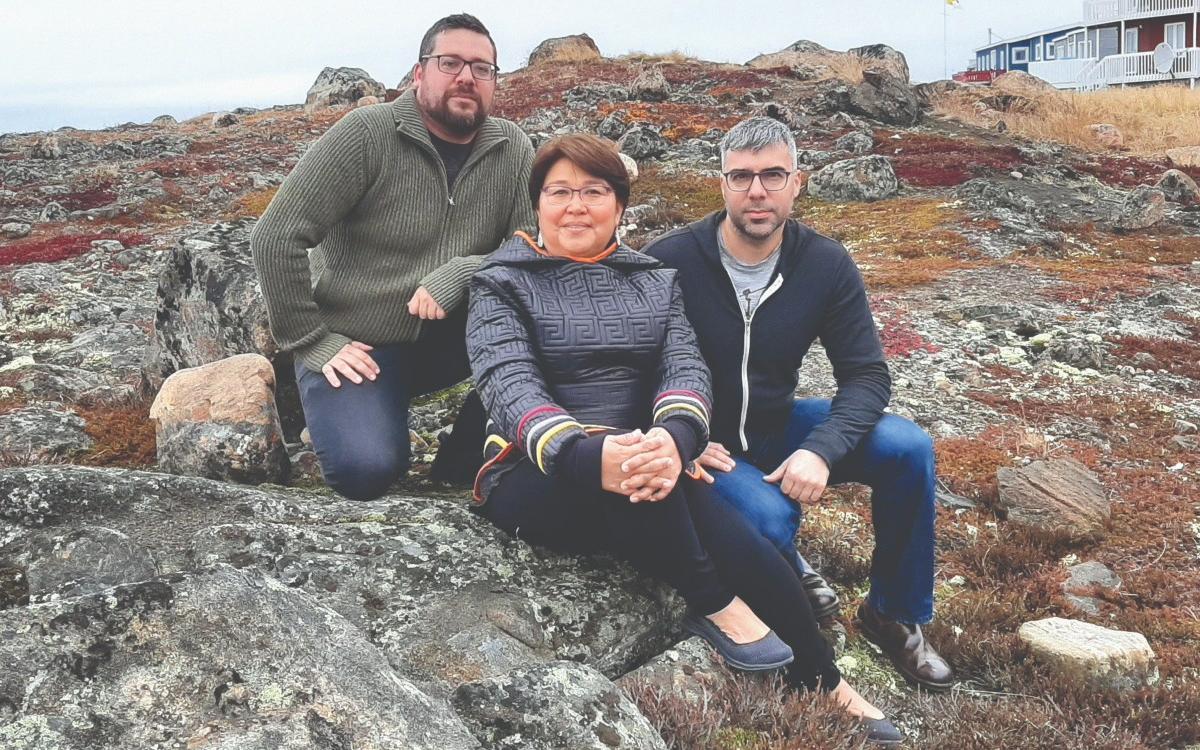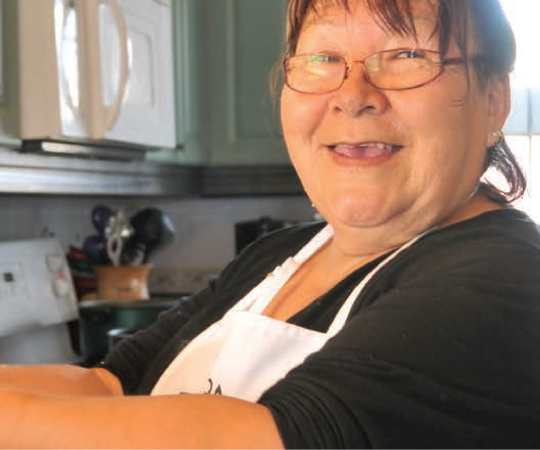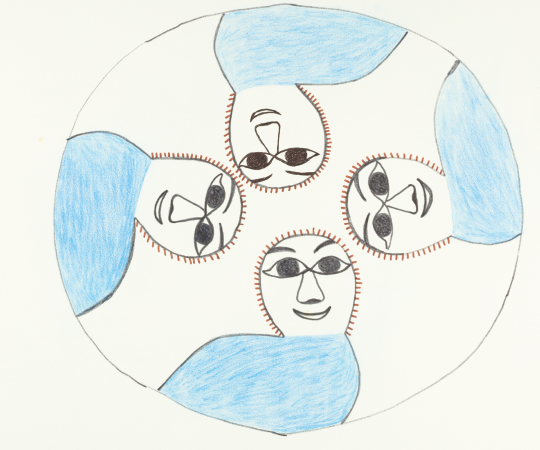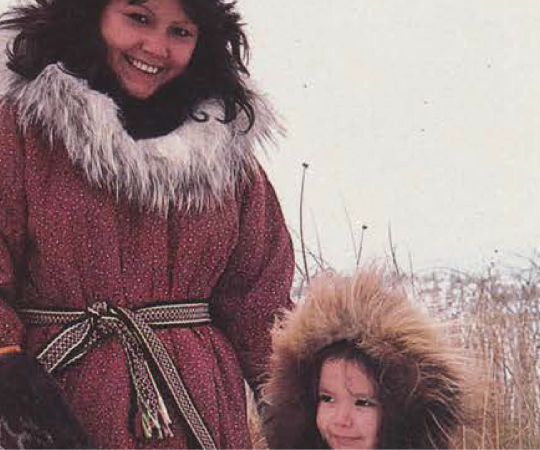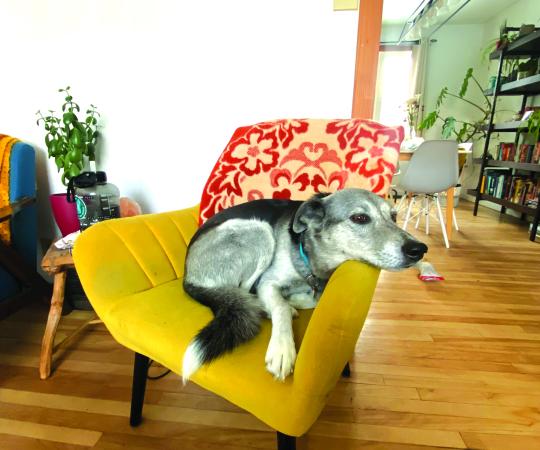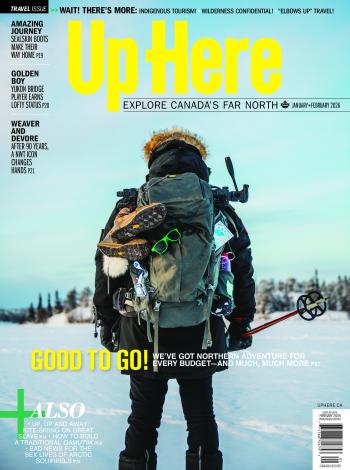Kathryn Couture sits down by the bay window in her kitchen and looks out at the dark morning sky. With a cup of coffee beside her, she admires the outline of snow-blanketed trees surrounding her off-grid cabin. The occasional raven croaks outside. When she’s ready, she opens her laptop and escapes into a fantasy world of her own making.
It’s a daily routine for the newly published author. Her first work, The Wolf, came out in 2021 and self-published the fictional novel, launching her own company, Dogfish Books, in the process. “I did a ton of research and it seemed the more viable way than to go through a more traditional route—especially up here,” Couture says.
Couture was turned off by the idea of writing one proposal after another to publishing houses based far from the Yukon—especially as internet and phone services are limited from her home. Besides, Couture didn’t want some company that knew nothing about the North getting a say in her stories.
And she isn’t the only storyteller who feels that way. Writers inhabit every corner of the North and yet there are few options within the territories to get their literature recognized. So, they have taken matters into their own hands.
In Dawson City—a town of less than 1,400 people—Couture is one of two independent publishers. With the goal of connecting comic writers across the North, Ottawa-born Kimberley Edgar began Hecate Press in 2020, six years after originally moving North. So far, Edgar has published The Northern Gaze anthology, which includes work from illustrators across the territories, including Yellowknife’s Alison McCreesh and Iqaluit’s Akeeshoo Chislett. With reoccurring grants from the Yukon government’s Culture Quest fund, Edgar is able to take in submissions for more works, with the hopes of connecting to artists in Nunavik and Labrador.
“Even if there’s a lot of cultural differences [between northern regions], there’s a lot of shared experiences,” Edgar says. “So I think it would be neat to create that kind of community—specifically for comics.”
Edgar has been creating comics professionally since 2018, after receiving a grant from Toronto organization CUE Art Projects. The first comic they ever wrote, drew and self-published, Bacchanalia, was nominated for a Broken Pencil Zine award and that encouraged Edgar to keep going. The following year, Edgar’s story about self-isolation and healing, The Purpose, won that award and now Hecate Press’s anthology is up for it as well. Meanwhile one of Edgar’s projects is set to be published with Conundrum Press in Nova Scotia. It goes to show that self-publishing is no longer for writers who can’t get their stories published traditionally. It’s a choice they make because the traditional route doesn’t always suit them.
The conventional wisdom in the industry is that a good project will find a publisher, says Yellowknife writer Annelies Pool. “But I don’t think that’s at all true,” she says. “They do look for good work, but they also look for things that sell.” In other words, a project might be worthy of publishing, but it doesn’t always get picked up because it’s too niche or doesn’t fit the current market.
That’s why Pool decided to self-publish her debut work, Iceberg Tea—a collection of previously published stories—in 2010. She took the project seriously, hiring editors as well as a designer for the book’s art to ensure it was professionally produced from cover to cover.
Both Pool and Couture chose to print with U.S. companies because it was cheaper than in Canada. Shipping was another matter. “If I shipped from the U.S. to Yellowknife, it cost something like six dollars [per book],” says Pool. “But if I shipped to Edmonton, it cost less than a dollar per book.”

But she called in some connections to make it work. She ordered the books to a friend’s house in Edmonton and another friend, who worked for a local airline, stepped in to ship her books to Yellowknife for free. It’s those connections in the North that has made self-publishing worthwhile for Pool—the first self-published author to be part of the Writers Union of Canada.
The largest and most successful publishing house in all the North is Iqaluit’s Inhabit Media. The company came to fruition around 2004, when former teacher Louise Flaherty grew tired of the lack of diversity in children’s literature. She says she had to take time outside of teaching and prepping for classes to cre- ate her own resources in Inuktitut for her students.
Eventually, Flaherty and another teacher, Neil Christopher, alongside Danny Christopher, started Inhabit to create more books for kids in Inuktitut.
They were able to access funds from the Nunavut government and the Qikiqtani Inuit Association to launch their initial titles.
Those publications received such positive reviews that the company founders knew they had to keep going. “Finally, there were books that reflected Nunavut culture and lifestyle written by Nunavummiut for Nunavummiut,” Flaherty says.
And with an expansion in funding from the Nunavut Government—particularly the Department of Education—Inhabit Media has published nearly 300 books, mostly geared toward children. There are many non-fiction books for adults as well, ranging from legendary Northern memoirs, the telling of Inuit legends, and comprehensive local histories.
What started as a company focused on Northern stories for Northern people is now an international success story. Inhabit’s titles can be found on Amazon, Shopify and in Indigo and independent book stores across Canada. Soon, Toronto will be home to its own Inhabit Media bookstore. Set to open in the Mount Pleasant neighbourhood this summer, kids will be able to choose from dozens of stories starring characters that resemble them. The books will also teach southerners about a part of the country they may know little about. “The world has yet to know about us, so I’m happy to have a store opening up in Toronto to showcase who we are and our rich stories,” says Flaherty.
She’s confident that with more advocacy, more Northern stories and voices will reach the south. And this wouldn’t be possible if Northerners weren’t so resourceful.
That’s crucial because, as Couture says, the more people know about the North, “the more likely people are to protect the North and treasure it.

